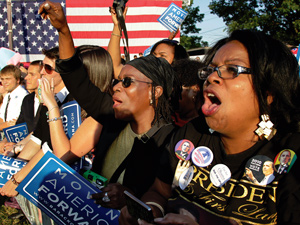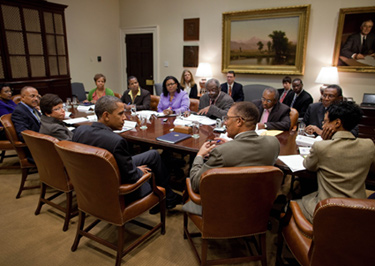Black voters to the rescue, again?
By Sonya Ross Associated Press | Last updated: Oct 27, 2010 - 9:10:28 AMWhat's your opinion on this article?
Democrats turn to ignored voter base when threatened with loss of Congress, Senate

President Barack Obama is cheered by supporters at a recent rally in Philadelphia, PA. He has spoken at numerous gatherings as critical midterm elections approach. Photo: AP/Wide World photos
|
The poster, not quite big enough to qualify as a billboard, reflects an unspoken bargain between Obama and Black voters: He asks, they deliver.
In October, President Obama was asking.
Polls indicate many minority voters are discouraged and won't turn out Nov. 2 as they did for Mr. Obama two years ago, yet a solid showing among Blacks could still swing several House, Senate and gubernatorial races, according to some analysts.
Ruy Teixeira, a political demographer for the Center for American Progress, said certain parts of the Democratic base—particularly young voters and minorities—typically “tune in” just before an election, and Democrats could improve their chances if they galvanize those constituencies.
“It is not at all clear that the outcome is going to be as grim for the Democats as at least some polls suggest today,” Mr. Teixeira said. “The Democrats could possibly get out of this election and still hold the House. I think it's going to be very difficult, but it is not as impossible as it might appear.”
Black voters are “strategically located” to impact as many as 20 House races, mostly in Southern states, explained David Bositis, a senior researcher at the Joint Center for Political and Economic Studies, who has analyzed the Black electorate for more than two decades. They also could sway more than a dozen Senate and governor's races, Mr. Bositis said.
“It's not something where the Democrats and the candidates are going to be out there yelling, ‘We want the Black vote,'” Mr. Bositis said. “They're going to work through the Black churches, the Black media.”
Mr. Bositis said this election could echo midterm elections in 1986, when significant Black turnout helped Democrats gain House seats and take control of the Senate, and again in 1998, when Democrats picked up governorships in Alabama, South Carolina and Georgia.
Both of those elections followed events that resonated with Black voters: Jesse Jackson's historic presidential campaign in 1984 and the GOP effort in 1998 to impeach then-President Bill Clinton.

(L-R) Rhonda Graham, Joe Davidson, White House Senior Adviser Valerie Jarrett, Lynne Varner, President Obama, Annette John-Hall, Rochelle Riley, Les Payne, DeWayne Wickham, Dwight Lewis, Askia Muhammad, and Tonyaa Weathersbee
|
While many Democrats are distancing themselves from President Obama, the party's approach with Black voters is to make the election about the president and his agenda.
University of Chicago political scientist Cathy J. Cohen said Democrats hope that by framing the election around the attacks on Mr. Obama and racial polarization arising out of the Tea Party movement, “Black voters will mobilize in particular districts so they can tip the balance.”
“I still think that Black people will come out and vote for what they think is the president's agenda, which is to vote Democratic,” said Ms. Cohen, author of a new book on Black youth and politics. “A solid Black turnout will be fine in some seats. But they need the excitement of 2008.”
To that end, the Democratic National Committee is spending $2 million on ad buys in Black media, far more than it spent on such buys in previous midterm elections. The president himself stopped by a White House briefing for Black bloggers and journalists from Black-oriented media. He also met at the White House with the Trotter Group, a group of Black newspaper columnists. (See related story, page 5.)
Mr. Obama also spoke at an Oct. 7 rally for Democratic Gov. Martin O'Malley that drew 7,000 people to historically Black Bowie State University. The school, about 20 miles east of Washington, is located in Prince George's County, Md., which, according to census data, is the nation's wealthiest majority Black county—65.6 percent Black with a median annual household income of $71,696.
The “got your back” posters stand at several major intersections in Prince George's, which also is home to Republican National Committee Chairman Michael Steele. “We've got your back, we've got your back,” the crowd at Bowie State chanted when President Obama took the stage with Gov. O'Malley and Lt. Gov. Anthony Brown, who is Black.
“What the other side is counting on is that this time around, you're going to stay home,” Mr. Obama told the crowd. “They figure Obama's not on the ballot, you're not going to come out and vote. Well, Maryland, you have got to prove them wrong.”
Whether that message is getting through to enough Black Democratic voters to make a difference is an open question.
Andrew Robb, 47, of Upper Marlboro, Md., said he plans to vote and is not buying into the notion of significant Democratic losses. “It's my civic duty, and I'm voting Democrat,” Mr. Robb said. “The Democrats are going to prevail. I think it's a lot of hype with the Republicans.”
But Joyce Walker, 55, of Bowie, also a Democrat, said she feels Democrats “might take a big hit” because many core voters are not fully engaged.
“Most people, they're not enthusiastic about the governor's election. They're mostly enthusiastic about the president,” said Ms. Walker, who does plan to vote on Nov. 2 when Gov. O'Malley faces Republican challenger Bob Ehrlich in the governor's race.
The 20 House races where Black turnout could determine the winner, according to Mr. Bositis' analysis, are in 14 states: Alabama, Arkansas, Delaware, Florida, Georgia, Louisiana, Maryland, Mississippi, North Carolina, Ohio, South Carolina, Tennessee, Texas and Virginia.
Related news:
As midterm elections approach, questions arise for and about Black voters (FinalCall.com, 10-12-2010)
INSIDE STORIES AND REVIEWS
-
-
About Harriett ... and the Negro Hollywood Road Show
By Rabiah Muhammad, Guest Columnist » Full Story -
Skepticism greets Jay-Z, NFL talk of inspiring change
By Bryan 18X Crawford and Richard B. Muhammad The Final Call Newspaper @TheFinalCall » Full Story -
The painful problem of Black girls and suicide
By Charlene Muhammad -National Correspondent- » Full Story -
Exploitation of Innocence - Report: Perceptions, policies hurting Black girls
By Charlene Muhammad -National Correspondent- » Full Story -
Big Ballin: Big ideas fuel a father’s Big Baller Brand and brash business sense
By Bryan Crawford -Contributing Writer- » Full Story






 Click Here Stay Connected!
Click Here Stay Connected!








